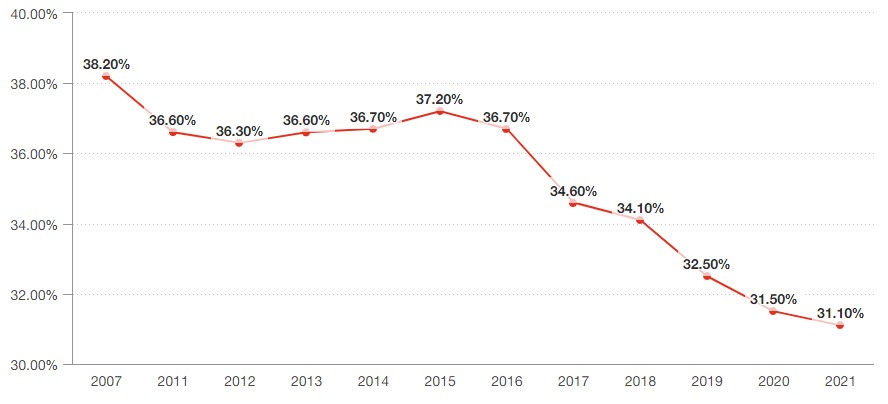▲Gender wage gap trend in Korea (Source = Samil PwC)
Among 33 OECD countries, Korea’s gender wage gap was the largest at 31.1%. However, since 2015, it has been analyzed that there is a continuous decreasing trend.
On the 8th, PwC commemorated International Women’s Day (March 8) and presented PwC’s ‘Women in Work Index’, which measures and evaluates women’s employment performance in 33 countries within the Organization for Economic Cooperation and Development (OECD). ‘ was announced.
According to PwC’s Women’s Employment Environment Index (WiW), the participation rate of women in 33 OECD countries increased slightly in 2021.
Closing the current gender pay gap (the percentage difference between the median earnings of women and men) could generate trillions of dollars in economic benefits, including an increase in women’s workers’ incomes of more than $2 trillion per year, the report said. However, given the fact that the gender wage gap within OECD countries has narrowed by only 3% in the past decade, from 17% in 2011 to 14% in 2021, it will take at least 50 years to improve the current wage gap.
In particular, Korea’s gender wage gap was 31.1%, the largest among 33 OECD countries.
The country with the smallest gender wage gap is Luxembourg (0.5%), showing a large gap with Korea. However, the gap is gradually narrowing from 41.7% in 2000, and since 2015, it has been showing a continuous decreasing trend.
In addition, it showed low rankings in various fields, such as the female labor force participation rate (59.9%, 29th), the proportion of women in the board of directors (8.7%, 33rd), and the female regular employment rate (76.8%, 18th). As for the overall ‘Female Employment Environment Index’, Korea scored 43 points and Mexico scored 41 points, ranking 32nd and 33rd among OECD countries, respectively.
The ranking of the best-performing countries on the gender equality index has not changed much from 2020, with Luxembourg moving up from third last year to first this year, New Zealand maintaining second place for the second year in a row, and Slovenia moving from first place. Ranked 3rd down.
In 2021, women’s unemployment rate showed a slight decline from the OECD average of 6.7% to 6.4%. Male labor force participation rates and employment rates also showed a similar trend, which is explained as a result of macroeconomic factors and the overall recovery of the labor market after COVID-19, rather than progress towards gender equality in the labor market.
In particular, the report predicted that if the female employment rate in the OECD as a whole increases to the same level as Sweden (which has the highest female labor force participation rate), a potential economic benefit of about 6 trillion dollars can be obtained annually. It is predicted that this will increase GDP by 325 billion dollars, or about 422.3 trillion won annually.
Meanwhile, PwC UK, which led the study, presented the results of an analysis of the impact of the ‘maternity penalty’ separately from the overall report subject for its own country.
The maternity penalty, which is considered the most important cause of the gender wage gap, was found to account for 60% of the causes of the gender wage gap in 25 European countries belonging to the OECD in 2021 (the remaining 40% is related to social norms, gender fixation, gender discrimination, etc.). reason), and accounted for 75% in some Nordic and Western European countries.
“It is shocking that a 20-year-old woman who got a job this year may not experience gender pay equality for the rest of her life,” said Samil PwC CEO Yoon Hoon-soo. We cannot rely solely on economic growth to achieve gender equality.”
